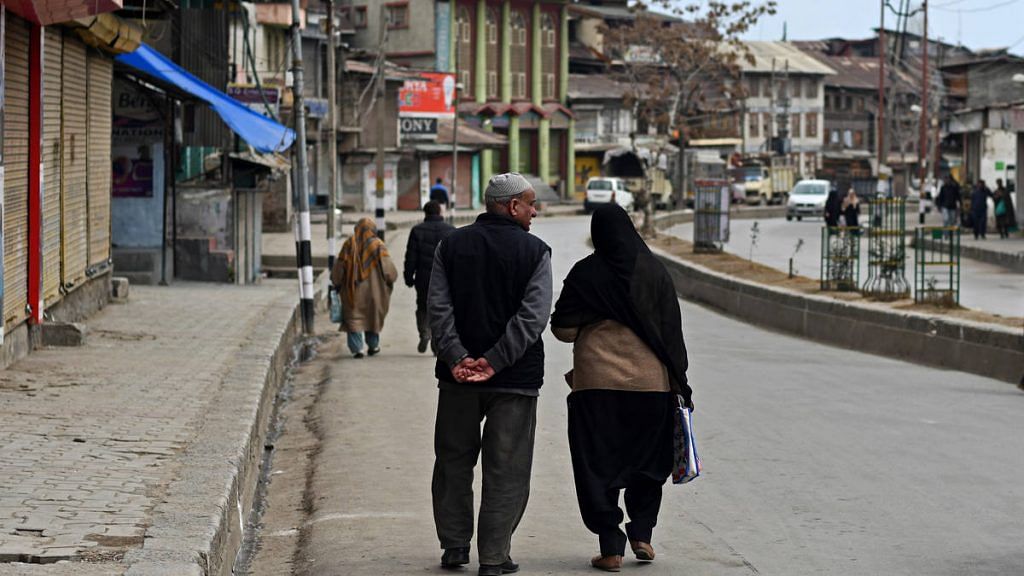New Delhi: An organisation backed by the Rashtriya Swayamsevak Sangh Monday launched a three-day campaign for the return of Kashmiri Hindus — who were compelled to migrate due to terrorism — to the Valley.
The Jammu-based Sanjeevani Sharda Kendra (SSK) has invited RSS Sarsanghchalak Mohan Bhagwat for an address on the third day of the programme, the body’s secretary Maharaj Krishan Bhat told ThePrint.
“We have organised this programme with the support of about 150 Kashmiri Hindu organisations globally. It is a three-day programme from 12 to 14 April, with the intention to celebrate tyaag (sacrifice), sankalp (resolve) and shaurya (valour) for a day each, and urge Kashmiri Hindus to take a pledge to return to their homeland on the auspicious occasion of Navreh (Kashmiri Hindus’ new year),” Bhat said.
Also read: How RSS helped save ‘Darbar Sahib’ twice and upheld Hindu-Sikh unity
Tyaag Divas
According to M.K. Bhat, the Navreh celebrations commenced on 12 April with Tyaag Divas in the memory of historical figure Shriya Bhat.
“Indian history has recorded the great contribution made by Kashmiri Pandit Shriya Bhat in saving Hindu culture as early as the 15th century,” the SSK secretary said. “Shriya Bhat, a physician, was able to cure a dreadful disease afflicting Sultan Zain-ul-Abidin and was offered enormous wealth and property. But Shriya Bhat instead negotiated for the safety and security of Kashmiri Hindus and their religious places.”
According to the SSK, Shriya Bhat was born after Kashmir had already passed into the hands of sultans when Shah Mir murdered the last Hindu queen Kota Rani in 1339 CE. Sikandar Shah Miri, who came to the throne in 1389, got the nickname ‘Butshikan’ for his idol-breaking, and Hindus faced targeted persecution.
Sikandar’s son Zain-ul-Abidin, who ruled from 1419, continued this policy of religious persecution. But then he developed a deadly boil that could not be cured by any physician, till he courtiers told him about Shriya Bhat.
A fearful Bhat went to the court but miraculously cured the king, who in turn promised to reward him with whatever he wanted. Shriya Bhat requested the king to stop persecuting Hindus, recall with honour all those who had fled Kashmir due to tyranny and genocide and put a stop to cow slaughter and the demolition of temples. The king accepted his plea, and thereafter, attained fame with his kind rule and came to be called Budshah.
M.K. Bhat added: “To celebrate this, young people up to the age of 35 shall take part in online competitions and submit a five-minute audio/video or an essay in Hindi, English, Kashmiri languages or Sharda Lipi (script) about life and sacrifice of Pandit Shriya Bhat.”
Sankalp Divas
On 13 April, the first day of the Hindu new year, the SSK will celebrate Navreh Sankalp Divas.
“Globally, all Kashmiri Hindus shall take a solemn pledge in the morning while performing the ritual darshan of ‘Navreh Thal’,” M.K. Bhat said.
“The pledge will be — ‘In the name of Goddess Sharda and Rishi Kashyap, I take a solemn pledge that I will be wedded to the cause of restoration of peace, tranquillity and foster bonds of brotherhood in Kashmir… I will make all my contribution to keep its tradition and culture alive, I will make earnest efforts that I along with my other members of the community will celebrate the next Navreh along with my family members and other community members in the Kashmir Valley’.”
Bhat added: “The entire Kashmiri Hindu community the world over — men, women and children, preferably attired in their traditional dresses — will take the solemn pledge while performing morning rituals on Navreh day.”
Video recordings and selfies taken at the time of pledge can be uploaded on social media, he added.
Shaurya Divas
Then, on 14 April, ‘Shaurya Divas’ will be celebrated in honour of 8th century king of Kashmir, Lalitaditya Muktapida, for his valour and victory over the Turks.
According to the SSK, Lalitaditya, of the Karkota dynasty of Kashmir, took the crown in 724 CE and expanded its territory far and wide — from present-day central Asia and the Silk Route in the north to the Konkan in the south and Bengal in the east.
The body said Lalitaditya formed a formidable alliance with the Rajput chief Bappa Raval, the Pratihara king Nagbhata and Chalukya king Pulakeshin II. This alliance took on the Arabs between 736 to 740 CE and pushed them beyond Sindh up to the Makran coast, and the invaders didn’t return for more than two and a half centuries, till Mahmud of Ghazni.
Al-Biruni, the court historian of Mahmud, wrote in his famous book Kitab-ul-Hind that the Kashmiris celebrate the second day of Navratra as the day of victory over the Arabs by their King Lalitaditya.
The end of the ‘Shaurya Divas’ celebrations will be marked by Sarsanghchalak Mohan Bhagwat’s virtual address, which is scheduled for 7 pm IST on SSK’s Facebook page.
The writer is research director with Delhi based think tank Vichar Vinimay Kendra. He has authored two books on RSS. Views expressed are personal
(Edited by Shreyas Sharma)
Also read: What Agha Ashraf Ali said when I asked about Kashmiri Muslims who chant ‘Pakistan Zindabad’
